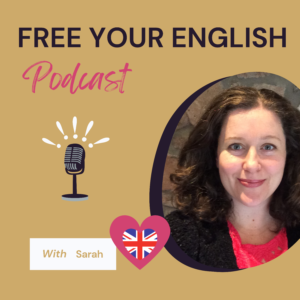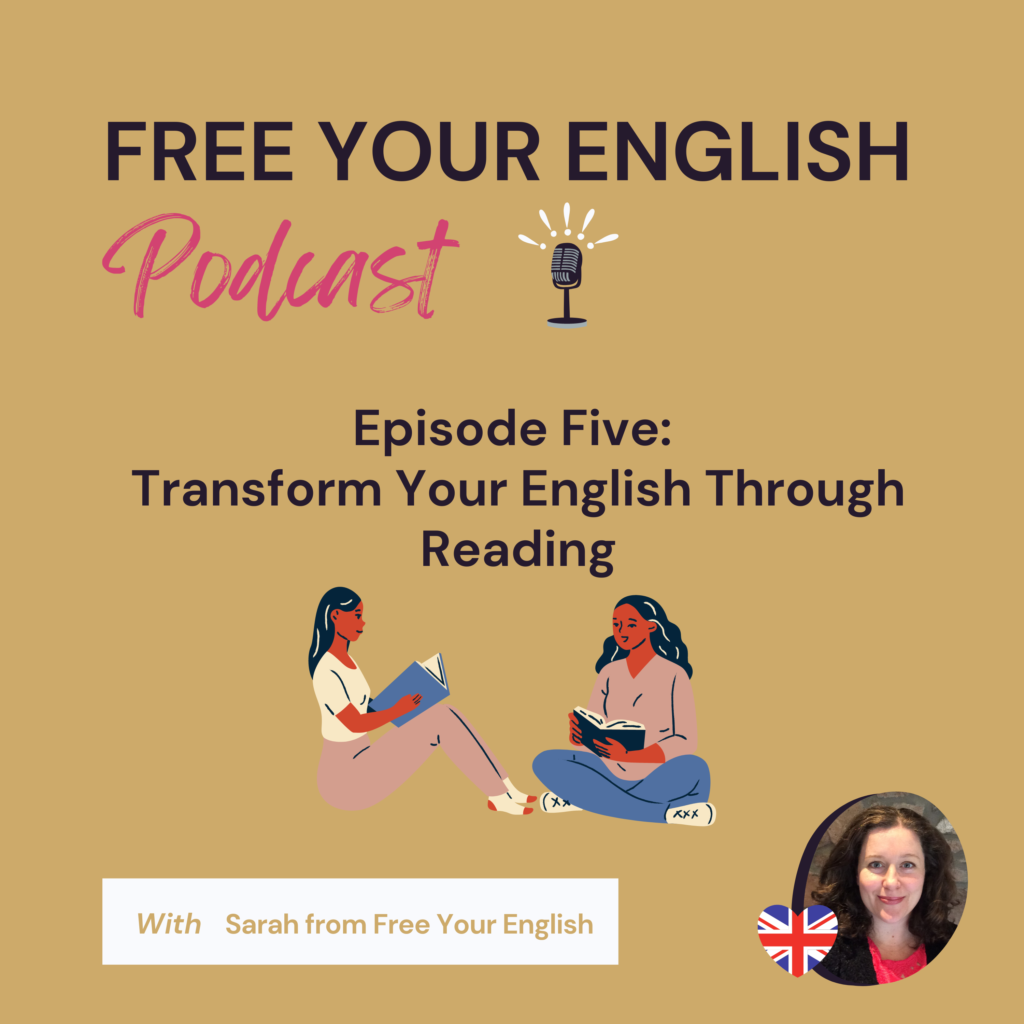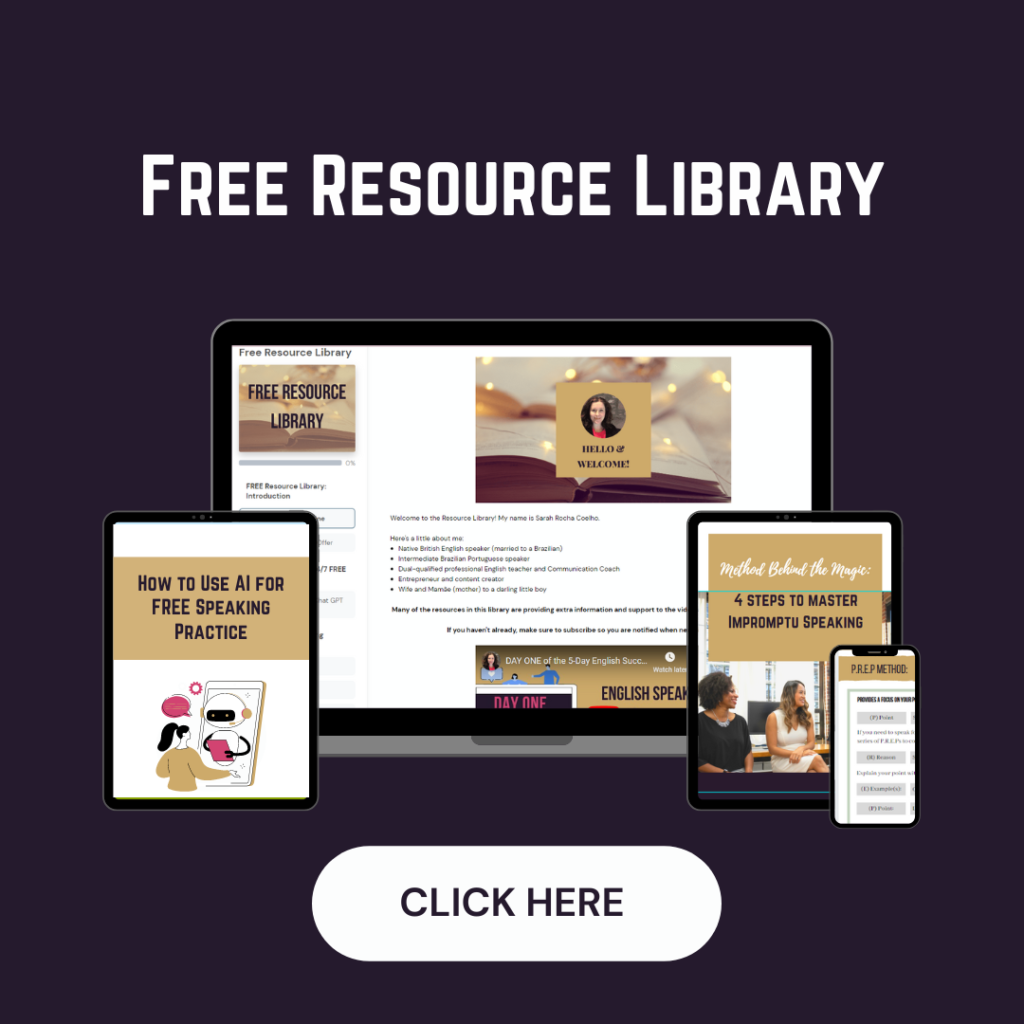Discover why reading is important for even high-level English learners, how it can be incorporated into your daily English learning routine, and some practical tips for selecting the best type of reading material for you.

Listen here:
Podcast transcript:
Hello! It’s Sarah here. Welcome to episode five of the Free Your English Podcast.
If you’ve listened to other episodes, you might already know that I am a British native English speaker and an Intermediate Brazilian Portuguese learner. (I love to add that in because I know what it is like to learn another language and struggle to express myself. I firmly believe every English teacher should ideally speak at least one other language… however, that’s a topic for a different episode.)
You might already know that I’ve been teaching for over two decades. However, I don’t think I’ve shared on the podcast that I am dual-qualified to teach English as an Additional Language and also English literature and language. I still have a day job where I teach High School English to native speakers.
As a High School English teacher (or Secondary English teacher as they would say here in the U.K) who spends a lot of time speaking about books, the topic on today’s episode is one I can’t get enough of.
Today, we are going to talk about reading! I’ll explain why reading is important for even high-level English learners, how it can be incorporated into your daily routine, and provide practical tips for selecting the best type of reading material for you.
I’ve found that many high-level English learners discount the value of reading after they reach the Intermediate level because it seems so easy, and they don’t really see the value.
One thing I always love to remind people is that reading doesn’t just help your reading!
It’s also one of the most effective ways to improve your vocabulary and grammar which means it significantly helps your writing ability but reading also has a knock-on effect on your overall comprehension of the language and so impacts all of your core skills.
“Knock-on effect” – there’s a great phrase. It means something that creates a chain reaction or ripple effect because one thing affects another, which in turn affects another, and so on. For example, if you missed your bus that would have a knock-on effect on the rest of your day. You might be late to work and because of that you might decide to work through lunch which means you feel more stressed and so on.
Anyway, reading has a knock-on effect on all of your English skills.
Reading also has a knock-on effect in other areas of your life. Studies have shown that reading also increases our levels of empathy and while that doesn’t directly help your English it is still something the world could do with more of!
Reading can also help you improve your focus. In my day job working with teens to help them develop their English, I have noticed a significant decline in most people’s ability to do what we might call “deep work” – i.e., work that requires a deep level of attention and focus for a long amount of time.
Perhaps it is a knock-on effect of the pandemic. Perhaps it is a result of spending too much time being entertained by fast-paced social media videos or doing too much multi-tasking all the time. I’m not sure but I’ve certainly noticed it. I’ve noticed it even within myself.
An effective antidote to this is to sit down and read – to train the mind to settle in and focus.
Joseph Addison once wrote:
“Reading is to the mind what exercise is to the body.”
Let’s talk about how you can incorporate reading into your daily routine.
One effective strategy is to read before bed. Not only is it a relaxing activity that can help you wind down (i.e. begin to relax) after a long day, but it also ensures that you consistently set aside time for reading. If reading before bed isn’t your thing, try reading during your morning commute or during your lunch break. The key is to find a time that works best for you and make reading a habit.
When choosing a book, it’s important to find one that is both enjoyable and at the appropriate level of difficulty.
Here’s my top tip gleaned (i.e. earned) from years of teaching reluctant readers. If you’re just starting out with creating a daily reading habit, it is important to read books that are below your current reading level.
Reading for enjoyment is key, and it is enjoyable to feel successful. I know from my own efforts in reading in Portuguese that if I have to stop all the time to try to use context clues to figure out the meaning of a word it is really demoralising.
One quick way to find the right book for you is to pick a page and read it. If there are more than three words you don’t know then consider it too difficult and not the right level to help you create a daily reading habit.
Of course, once you have built up that daily reading habit, you can start to add in more challenging texts, but I wouldn’t start with texts that are really difficult for you.
Make sure you consider a wide variety of texts too. Try novels, short stories, newspaper articles, autobiographies, magazines, and graphic novels, etc.
Coming up soon on the podcast, I am going to have my first ever guest on – Rachel Strivelli who is the author of a book called “Talk to the Trees: Wake up to Wonder, Wisdom and Calm.” I’ve included the link to her book in the show notes for you.
In preparing to interview her, I of course read her book (which is fantastic) but I also discovered something really useful. I found out that if you buy the digital version of a book on Amazon kindle and there is no audio version available, you can create your own easily. All you need to do is ask Alexa to open the Kindle version of the book for you and read it. Isn’t technology amazing?
I would highly recommend that you do this sometimes as reading a book while listening to the audio is very useful for your pronunciation.
Before we wrap up this episode, I just want to add that within my membership – The English Speaking Society – there are two high-level reading texts provided each month that help you see the vocabulary words for the month used in context. One is a non-fiction opinion-based article and the other is always a fictional story. I invite you to check out the membership if you are looking to create some excellent English learning habits.
I’m all about getting people to practice speaking so I just want to add in a quick speaking practice prompt for you before we end. Take out your phone and record yourself speaking. Summarise what this podcast episode covered and whether there was anything that seemed surprising to you. Explain why or why not.
Lastly, I’d love it if you’d come say “hi” on Instagram or Facebook and share what stood out to you as important from today’s episode. I’d love to hear what you are reading about at the moment as well.
Take care and thanks so much for listening!
Your next steps:
The podcast mentions the English Speaking Society which is no longer available any longer.
You might like to check out my FREE Resource Library to take action towards gaining the confidence and clarity in English that you desire.
It includes: instructions on how to use AI for free speaking practice, worksheets, interactive quizzes and more – all for free!
Click the image below:

